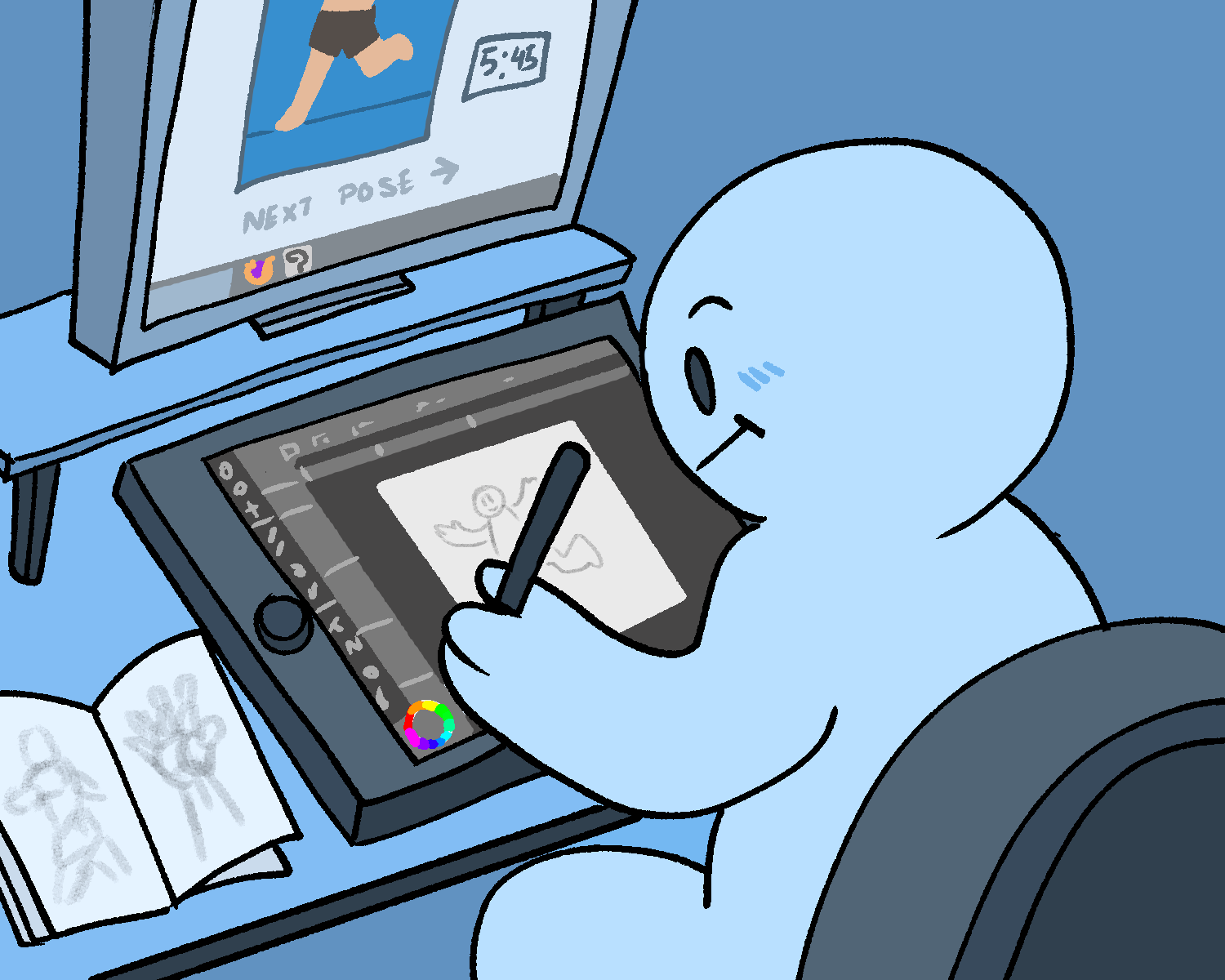Using Visual References

What are references, and why do we need them?
References are visual aids that helps you draw something, such as photos you take yourself, photos you find on the internet, 3D models, live models, miniature toys, or materials you draw on the side for characters or vehicles or outfits you know you’re going to be using in your pages.
Stopping to find or make good references can be a step you gloss over in the interest of getting the page out. But long-term, there are a lot of benefits that you can get out of working them into your webcomic-making process, including:
- Accuracy to portray characters and environments in a non-distracting way
- Learning anatomy and technical construction
- Speed/efficiency to generate art quicker
- Consistency from panel to panel.
Developmental References
Understanding and studying how to deconstruct a subject you’re drawing and why it works will help make your comic’s visuals natural and compelling, and long term help you build future poses from scratch. If you’re looking for a certain pose of a character falling, for example, finding multiple angles will help you understand why the body is doing what it’s doing and translate that to your sketches.
Gesture or environment drawing practice can also greatly help understand general facets of how the body moves, how houses and buildings are constructed, and how perspective works and will help immensely for making your own.
Using references to develop your skills or project isn’t limited to technical accuracy either! You can gather photos as inspiration for lighting, cinematography, moods, fashion and colors to hone in on a certain aesthetic or emotional beat to carry through a location or scene.
Emergent References
All of these are great to make a habit of practicing before you get to a scene, but references aren’t something you always have to put together before you start your comic, either! Once you’ve been drawing your comic, you may realize you have more or different needs for references as you go. Add to your toolbox with anything that you think might save you time and effort, including:
- Sketches from scrapped pages can be set aside as references to use in future pages
- Reference sheets of costumes and colors can help keep things consistent from page to page.
- Take pictures of yourself or a friend and send them to yourself with Dropbox or Discord if you realize you need help visualizing a specific pose
- Clip Studio Paint and SketchUp Warehouse have models of people and buildings that can help you form the basics of a room or pose
What are some things to keep in mind when using references?
- References are for every style, not just “realistic” ones. Even if technical accuracy is less important because you have a cartoony style, references can be huge time-savers that you shouldn’t overlook. Make character reference sheets, take pictures of rooms, so you don’t have to remember details or make them up on the fly.
- Make sure to credit where credit is due, and if you are using assets, be sure to check their usage license or properties! Look for terms similar to “Creative Commons” of “For any use”, and read the fine print. A lot of art specific reference providers will have terms of use that clearly state what they allow.
- Keep in mind what you want out of each reference. It can get so easy to get lost in detailing things that aren’t actually contributing to the purpose of the panel, especially in environments, so practice abstracting those details when the focus of your panel is different than the focus of your reference.
- Know when you’re using references to stall. Many times we don’t think we can start on a project until we have everything figured out, and will use a reference-gathering phase as a screen from starting at all. There will always be opportunities to incorporate references into your process, and the more you work, the more you’ll find what you actually need. Make sure you’re using them in a way that helps you move forward!
- Don’t be afraid to ask for help! Many commission artists are happy to create spaceships, character designs, 3D models, and other references for you! Supporting another artist and getting a valuable tool to use that you couldn’t have made yourself is a win-win!
